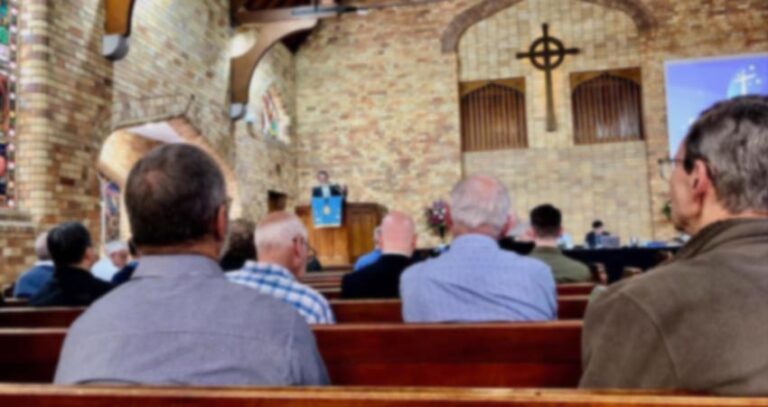Procedures to Follow
Section Five
Procedures to Follow
The Presbyterian Church of Australia has adopted some standard procedures for bringing issues of concern before its courts. These standard procedures ensure that all matters are dealt with openly, fairly and consistently. Some of these standard procedures are explained briefly below. There may be some slight variation from State to State, but the principles are the same.
This section will deal with Calls, Petitions and Overtures, Appeals and what is known as the Barrier Act procedure. A brief comment on Church Discipline is also included.
Calls
A Call is the usual way in which a minister (or teaching elder) is invited to take up ministry within a congregation. A call will need the support of the Presbytery before it can proceed.
When a call is issued to an ordained minister or a licentiate within the Presbyterian Church of Australia, the procedure is straightforward. In cases where the one to be called is a minister of another denomination, either from within Australia or from overseas, the advice of the Committee on Reception of Ministers will need to be followed.
In general, however, the process is as follows:
• The congregation has to be declared vacant by a formal statement authorised by the Presbytery,
• The Presbytery, appoints an “Interim” Moderator who will be a minister from the Presbytery. The interim moderator will be responsible to oversee and advise the congregation while it is vacant.
• The congregation has to meet to determine whether to move to a call immediately or elect a committee of its members to seek out a new minister for recommendation to the congregation
• When a name is recommended, the congregation is given the opportunity to support the recommendation or not. If the congregation votes to insert a minister’s name in the call, all communicant members are able to sign the call. (Normally a call must have at least 60% support of the communicant members before it will be considered by the Presbytery.)
• The Presbytery will meet to consider all aspects of the call, including the proposed remuneration (generally known as the Terms of Call). If it is satisfied that the congregation is able to fulfil the “Terms” and that the minister is considered to be well-suited to take up this particular call, the call is sustained. If the Presbytery is not convinced that the call will advance the congregation, it must disapprove the call, in which case the selection process will be resumed.
• When the Presbytery sustains a call to a minister presently serving in another congregation, it must send the call to the Presbytery that holds jurisdiction over the called minister. That Presbytery will then consider the impact on the minister and his current congregation.
• The calling congregation is entitled to send representatives to explain why the call should be accepted, and the congregation where a minister is presently serving is also entitled to send representatives to explain why their minister should stay.
It is important to note that a congregation cannot arrange its own ministry without the support and approval of the Presbytery.
Overtures
An “overture” is a document by which Assemblies are asked to consider the matter or matters which the overturists consider to be for the betterment of the Church. Some matters, such as changes to the Church’s constitution or rules cannot be considered except in response to an overture.
Overtures can be presented to an Assembly by a Session, Presbytery, Assembly committee or by a number of its own members.
An overture should be set out in a prescribed form. This will ensure that the overture will clearly state what changes or interpretations are being asked for, and the reasons why they are necessary. All Session, Presbytery or Assembly Clerks Assemblies should be able to assist in this. If the overture is not set out properly (i.e. if it is “not in proper form”), it may not be considered.
When an overture comes to the Assembly those who are bringing it are usually given an opportunity to explain what changes they would like to see, and why. Questions may be asked by the Assembly. After that, the following may happen:
• The Assembly may decide to “sustain the overture” which simply means that the matter will be formally considered by the Church. It does not mean that the Assembly will do what has been asked. After considering the overture, a court may or may not adopt the course of action requested by the overturists.
• The Assembly may decide to dismiss the overture which means that the request in the overture will not be further considered.
When an Assembly sustains an overture involving a rule change, the decision must first be sent to presbyteries (and, in to GAA to State Assemblies) for approval or disapproval before the changes can take effect. In some cases, “interim authority” might be given to allow the changes to take effect before the Assembly next meets to consider the views of the lower courts.
Petitions
A petition is usually used to bring before the presbytery or Assembly a matter of particular interest to the petitioner. All members and adherents have the right to petition to their own Session, and may also petition the Presbytery or the Assembly. However, all petitions must first be presented to their local session if the relevant matter is within the province of that court. In certain cases, people who are not members or adherents of the Presbyterian Church may also petition the Assembly. Those who bring a petition are called ‘Petitioners” and when they are formally presenting their petition, they are said to be at the “bar” of the court.
A petition should be set out in the prescribed form. This will ensure that the petition will clearly state what is being requested by the petitioners and the reasons for the request. All Clerks of Sessions, Presbytery and Assembly should be able to assist in this. If a petition is not set out properly [i.e. “not in proper form”], it may not be considered.
When a Petition comes to the court dealing with it, the petitioners are usually given an opportunity to explain what they want and why. Petitioners should be prepared to answer questions regarding their petition and the consequences which might arise from any action they are seeking.
After that, the following may happen:
• The court may decide to “grant the prayer of the petition” which simply means that the matter will be formally considered. It does not mean that the court agrees with everything written in the petition, or that the requested action will be approved.
• The court may decide to dismiss the petition, which means that the request in the petition will not be further considered.
• The court may decide to respond in some further way.
If the results of a petition are unsatisfactory to a petitioner, it may be possible to appeal the decision. [See Appeals, below.]
Where other people are mentioned in a petition, copies of the petition must be forwarded to them before the petition is to be heard.
Appeals
Another aspect of Presbyterian Church government is the right of appeal. Sometimes Church courts make mistakes. If a member of a court of the Church involved in making a decision genuinely believes that the court has made a mistake, it may be possible for that decision to be reviewed by another group of presbyters. An appeal is also possible when a petitioner believes that their petition has not been properly considered. Those appealing a decision are called “appellants” and those who defend the original decision are called “respondents”. When the appeal is being heard, both appellants and respondents are said to be at the “bar” of the court.
There are certain steps that must be followed when individuals are considering lodging an appeal:
• They must record their “dissent” to the decision at the time the vote is taken.
• They must indicate their intention to appeal the decision at the time dissent is recorded,
• They should then be given a confirmed “extract” copy of the appropriate minutes of that part of the meeting so that there is agreement on exactly what happened leading up to the appeal and on what was actually decided.
• The full Appeal must be submitted to the court within the time allowed for by the various State rules and regulations.
An appeal must explain clearly why a particular decision was wrong. To do that it must show how the decision appealed against is not supported by the Bible, the Church’s understanding of Biblical doctrine or by a proper and careful interpretation of the various rules of the Church, or that it involves a denial of natural justice. The appeal process must not be used simply because a decision was contrary to personal opinion or because it was unpopular. In those cases, a court might declare that an appeal was “frivolous” (that is, it has been lodged for irrelevant reasons) or “vexatious” (that is, it was lodged to cause trouble and annoyance). Normally an appeal will delay any action on a matter until the appeal is settled.
An appeal should be set out in the prescribed form. This will ensure that the appeal will clearly state what is being requested by the appellant and the reasons for the request. All Clerks of Sessions, Presbytery and Assembly should be able to assist in this, or lead the appellant to someone who can. If an appeal is not set out properly [i.e. “not in proper form”] it may not be considered.
When an appeal comes to the court dealing with it, the appellant is usually given an opportunity to explain the content of the appeal and give reasons why a certain decision ought to be set aside. Members of the court which made the decision are also able to give reasons why their actions should not be overturned. Questions may be asked of both parties.
• The court may decide to “sustain the appeal” which means that the appellant has shown that his or her argument was correct. It does not mean that the court agrees with everything written in the appeal. After sustaining the appeal, a court may or may not adopt the course of action requested by the appellant. It may also direct a court to go back and decide the matter de novo [i.e. all over again. See definition in appendix.].
• The court may decide to dismiss the appeal, which means that the appellant has been unable to persuade the court that their view was correct. If this is the case, the original decision stands, and if the appeal stopped any action, that action can now continue.
Appeals against decisions of Congregations, Committees of Management and Sessions are usually heard by the Presbytery and appeals against Presbytery decisions are usually heard by the State Assembly. A Court may also decide that under the rules of the Church, it does not have the proper authority to hear an appeal. Only appeals relating to those areas where the General Assembly has final authority can be appealed to the General Assembly of Australia. Presbyteries and State Assemblies can also hear appeals which deal with these matters, but if they do, their decisions can always be appealed to the General Assembly of Australia for a final decision.
The Barrier Act Procedure
The “Barrier Act procedure” is the name given to the method by which the Church changes its doctrine, constitution and rules. The term comes from the Church of Scotland which first established the procedure in the Barrier Act of 1697. It is a method which ensures that any changes to the Constitution and rules of the Church can only happen after they have been carefully considered. For example, one General Assembly of Australia cannot make any binding doctrinal changes for the Presbyterian Church without sufficient approval of the whole Church. The same principles are followed in the State Churches for all their rules and procedures. Barrier Act procedure will obviously take time, but the time taken ensures that the Church’s voice is heard to the level of the presbyters.
Barrier Act procedure is usually adopted after an Overture has been sustained, and an Assembly has agreed that certain changes are desirable. The suggested changes are forwarded as a remit to all relevant courts for their approval or for their disapproval. Overtures from State Assemblies are referred to Presbyteries and overtures from the General Assembly of Australia are referred to State Assemblies and Presbyteries. In some cases, Barrier Act procedure may also be used to allow for comment on possible changes before they are put in final form.
An Assembly may allow for “interim authority” to be given to a proposed change. This means that these changes have temporary effect until the result of the remit is known, and a vote taken at another Assembly. It is always possible that a matter which has “interim authority” will be disapproved at the next meeting of the Assembly.
Discipline
From time to time it might be necessary for courts of the Church to act in a disciplinary way. Procedures for Discipline are set out clearly in a separate document called The Code of Discipline . Anyone wishing to study that document should ask a minister or the clerk of the local Session or Presbytery for a copy. The Code of Discipline sets out its approach to discipline in the following way:
“Discipline is exercised by those appointed to rule in the Church for the glory of God, the purity of the Church and the spiritual good of the offender. Discipline is to be administered in a spirit of faithfulness, love and tenderness.” (Code of Discipline 1.02)
The Declaratory Statement (i-iv)
Redemption 114. (i) That in regard to the doctrine of redemption as taught in the subordinate standard, and in consistency therewith, the love of God to all mankind, His gift of His Son to be the propitiation for the sins of the whole world, and the free offer of salvation to men without distinction on the grounds of Christ’s all sufficient sacrifice, are regarded by this Church as vital to the Christian faith. And inasmuch as the Christian faith rests upon, and the Christian consciousness takes hold of, certain objective supernatural historic facts, especially the incarnation, the atoning life and death, and the resurrection and ascension of our Lord, and His bestowment of His Holy Spirit, this Church regards those whom it admits to the office of the Holy Ministry as pledged to give a chief place in their teaching to these cardinal facts, and to the message of redemption and reconciliation implied and manifested in them.
God’s Eternal Decree 115. (ii) That the doctrine of God’s eternal decree, including the doctrine of election to eternal life, is held as defined in the Confession of Faith, Chapter III, Section 1., where it is expressly stated that according to this doctrine, “neither is God the author of sin, nor is violence offered to the will of the creature, nor is the liberty or contingency of second causes taken away, but rather established”; and further, that the said doctrine is held in connection and harmony with the truth – that God is not willing that any should perish, but that all should come to repentance, that He has provided a salvation sufficient for all, and adapted to all, and offered to all in the Gospel, and that every hearer of the Gospel is responsible for his dealing with the free and unrestricted offer of eternal life.
Infants, and those without pale of ordinary means 116. (iii) That while none are saved except through the mediation of Christ and by the grace of the Holy Spirit, Who worketh when and where and how it pleaseth Him; while the duty of sending the Gospel to the heathen who are sunk in ignorance, sin and misery is imperative; and while the outward and ordinary means of salvation for those capable of being called by the Word are the ordinances of the Gospel, in accepting the subordinate standard it is not required to be held that any who die in infancy are lost, or that God may not extend His Grace to any who are without the pale of ordinary means, as it may seem good in His sight.
Man’s fallen Nature 117. (iv) That in holding and teaching, according to the Confession of Faith, the corruption of man’s nature as fallen, this Church also maintains that there remains tokens of man’s greatness as created in the image of God, that he possesses a knowledge of God and of duty – that he is responsible for compliance with the moral law and the call of the Gospel, and that, although unable without the aid of the Holy Spirit to return to God unto salvation, he is yet capable of affections and actions which of themselves are virtuous and praiseworthy.
Liberty of Opinion 118. (v) That liberty of opinion is allowed on matters in the subordinate standard not essential to the doctrine therein taught, the Church guarding against the abuse of this liberty to the injury of its unity and peace.
Civil Magistrate 119. (vi) That with regard to the doctrine of the civil magistrate and his authority and duty in the sphere of religion, as taught in the subordinate standard the church holds that the Lord Jesus Christ is the only King and Head of the Church, “and Head over all things of the Church, which is His body.” It disclaims, accordingly, intolerant or persecuting principles and does not consider its office-bearers, in subscribing the Confession, as committed to any principles inconsistent with the liberty of conscience and the right of private judgement, declaring in the words of the Confession that “God alone is Lord of the conscience”.
Download “An Introduction to the Presbyterian Church of Australia” Booklet
Latest Articles









